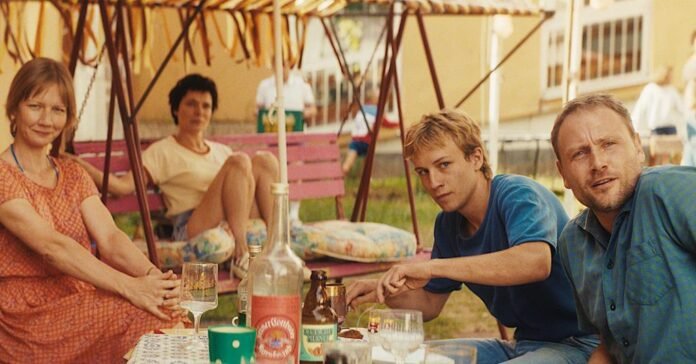Dir/scr: Natja Brunckhorst. Germany. 2024. 115mins
Speak about fast off the mark. In July 1990, East Germans got precisely six days after their foreign money was changed by the West German mark to alternate any ‘outdated’ cash and banknotes that they had been hoarding. A monetarist trauma that made for a mere footnote in Good Bye, Lenin! turns into the primary story driver of sentimental unification comedy Two To One – a title taken from the unfavourable alternate fee that was imposed on ‘Ostmark’ swaps.
A light-weight-hearted comedy with its coronary heart in the fitting place
Author/director Natja Brunckhorst – who first got here to consideration because the teenage protagonist of Uli Edel’s Christiane F. (1981) – delivers a light-hearted comedy with coronary heart, even when it lacks drama. Fuelled by a mixture of twinkly Ostalgie (nostalgia for East Germany) and a extra diffuse, common sympathy for these strange individuals who get dumped off the capitalist truck when it hits a bump within the highway, Two To One advantages from the presence of Sandra Huller, who will will entice audiences regardless of a flimsy position. Opening the 2024 Munich Movie Pageant earlier than hitting German cinemas on July 25, it has already offered to territories together with Spain, France, Greece and Australia, the place it ought to work fairly properly as ‘arthouse lite’ programming.
It’s the lengthy, scorching summer time of 1990 in a housing property outdoors Halberstadt, East Germany, that seems to have been constructed for the households of business staff. The torpor we really feel on this suburban enclave, with its dilapidated socialist-modern buildings and tatty communal gardens, isn’t simply climatic. Again then, within the months between the autumn of the Berlin Wall and unification, East Germans have been dwelling in a limbo, not understanding fairly the place they have been headed. A number of the residents of what’s depicted as a close-knit neighborhood have already ‘gone over’ – upped sticks and moved west. Genial big Volker (Ronald Zehrfeld), however, took his possibilities in Hungary – however now he’s again to being the awkward third wheel within the steady-ish relationship between free-spirited mom of two Maren (Huller) and her loving however jealous companion Robert (Max Riemelt).
Whereas Maren’s teenage son Jannik (Anselm Haderer) will get chased by the more and more demotivated native police for the anti-unification graffiti slogans he scrawls across the property, Maren, Robert and Volker set off on a ‘revolutionary’ caper of their very own with the assistance of Markowski (Peter Kurth, within the movie’s most affecting character flip), a curmudgeonly older relative with a consuming behavior. He simply occurs to work within the underground storage facility the place the East German authorities had been dumping sackloads of out of date Ostmarks, as a result of they don’t have the capability to burn them. That a part of the story is – remarkably – true, as is the truth that many have been stolen earlier than the notes have been lastly incinerated in 2002. However Brunckhorst’s script finesses the timescales to permit Maren and her merry males to stroll away with bundles of East German banknotes when there was nonetheless the briefest window of alternative to spend them.
We’ve got to tackle belief the loopholes which allow these last-minute exhanges – reminiscent of the flexibility to offer money to returning East German diplomats who’ve an extended window to exchage their Ostmarks. These, nevertheless, permit us to get to the true meat of the matter, which is to indicate how a neighborhood raised on socialist values reacts when sudden riches arrive. Solidarity and greed face off, and the need to offer one thing again to this betrayed and disenfranchised place overlaps with a want to stay it to the person. The person, on this case, being each these rapacious West Germans who’re speculating on a spot they positively need to fail, and the representatives of a former socialist regime that was presupposed to serve the folks however ended up feathering the nest of celebration officers and high-ranking apparatchiks.
The curious lack of pressure of the 2 heist scenes set within the underground bunker units the straightforward tone for a comedy the place conflicts are likely to fizzle out earlier than they turn into both tense or humorous, and story growth is simply too usually changed by cute montage scenes set to an indie nation soundtrack. Trabant automobiles, a Barkas B1000 (the East German equal of the VW Kombi van) and the peerlessly gauged not-yet-Western costume sense of those in-between Germans will increase a smile, particularly on dwelling floor – the place the director’s choice to forged solely actors from the previous East Germany also needs to garner some kudos. Nevertheless it’s the movie’s location scouts who actually deserve a prize for having discovered some good-looking surviving examples of socialist fashionable structure, public artwork and stylishly hip interiors to behave as backdrops to this sunny power-to-the-people meander.
Manufacturing firms: Row Footage, Zischlermann Filmproduktion
Worldwide gross sales: The Playmaker, worldsales@playmaker.de
Producers: Suzanne Mann, Karsten Stoter, Paul Zischler, Martin Rehbock
Cinematography: Martin Langer
Manufacturing design: Jenny Roesler, Florian Kaposi
Modifying: Ramin Sabeti
Music: Hannah von Hubenet, Amaury Laurent Bernier
Major forged: Sandra Huller, Max Riemelt, Ronald Zehrfeld, Ursula Werner, Peter Kurth, Martin Brambach, Kathrin Wehlisch, Anselm Haderer, Lotte Shirin Kelling
